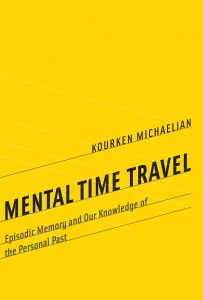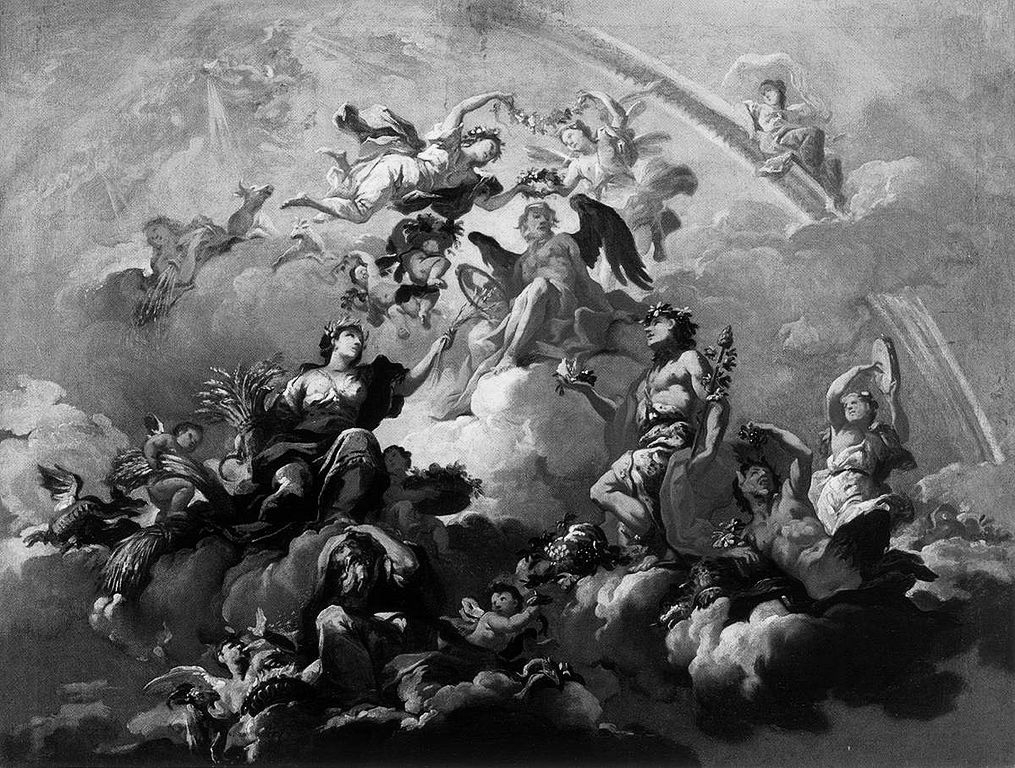What is memory? How does it give us knowledge? When and why did it emerge? These are the questions that I grapple with in Mental Time Travel: Episodic Memory and Our Knowledge of the Personal Past (MIT Press, 2016). In this and the next two posts, I’ll give an overview of the answers developed in the book.
I begin with the first question. What is it to remember one’s past? What, in particular, is the difference between remembering an event and merely imagining it?
 Philosophers have proposed various accounts of the difference between memory and imagination, but the most influential of these has been the causal theory, which was given its first detailed development by Martin and Deutscher and which continues to find many advocates. The key idea of the theory is that what makes the difference between genuinely remembering an event and merely imagining it is the presence, in the former case but not the latter, of a causal connection with the “remembered” event. Of course, many different sorts of causal connection might obtain, and most versions of the causal theory incorporate a reference to memory traces, the idea being that, in order for a causal connection to underwrite genuine memory, it needs to go via a stored trace originating in the subject’s experience of the event.
Philosophers have proposed various accounts of the difference between memory and imagination, but the most influential of these has been the causal theory, which was given its first detailed development by Martin and Deutscher and which continues to find many advocates. The key idea of the theory is that what makes the difference between genuinely remembering an event and merely imagining it is the presence, in the former case but not the latter, of a causal connection with the “remembered” event. Of course, many different sorts of causal connection might obtain, and most versions of the causal theory incorporate a reference to memory traces, the idea being that, in order for a causal connection to underwrite genuine memory, it needs to go via a stored trace originating in the subject’s experience of the event.
This would be fine if memory worked like a tape recorder, preserving records of experience unchanged over time. But the tradition of research on constructive memory tracing back to Bartlett has abundantly demonstrated that memory works nothing like a tape recorder. Remembering isn’t a matter of preserving a record of experience over time. Instead, when one remembers, “retrieving” a memory, one creates a new representation of an event, and, while some elements of that representation may originate in one’s experience of the event, others may not. Memory, in short, is not preservative but generative.
In earlier work, I attempted to reconcile the generative character of memory with the causal theory by modifying the latter to acknowledge that the content of a retrieved memory may differ to some extent from that of the original experience. The core idea of the resulting causal theory of constructive memory was that, while not all of the content of the memory needs to originate in the experience, at least some of it does, thus accommodating both the generative character of memory and the necessity of a causal connection.
In the book, however, I argue that, besides being hopelessly vague (how much difference between the content of the memory and the content of the experience is too much?), the causal theory of constructive memory is overly conservative with respect to the possibility of differences between experience and memory. Contemporary research on remembering as mental time travel suggests that genuine remembering can occur even when none of the content of a memory originates in experience of the remembered event. If this is right, we have to give up on the idea that remembering requires memory traces. And thus we have to give up on the idea that remembering can be distinguished from imagining by the fact that it involves a causal connection.
But if remembering can’t be distinguished from imagining in causal terms, how can it be distinguished from imagining? The answer defended in the book is that it can’t: to remember just is to imagine the past.
The mental time travel framework, based on Tulving‘s foundational insights and supported by a wealth of imaging, behavioural, clinical, developmental, and other evidence, sees remembering the past as the mirror image of imagining the future. Both remembering the past (past-oriented mental time travel) and imagining the future (future-oriented mental time travel) are a matter of imaginatively projecting oneself into a mentally simulated event. In both cases, one has a subjective sense of mentally travelling in time. And in both cases, while past experience provides the raw materials for the simulated event, simulating an event is not a matter of simply retrieving a stored representation of it — instead, it is a matter of transforming and integrating elements from various experiences into a coherent whole.
Obviously, when one imagines a future event, the content of one’s representation of the event does not originate in one’s experience of it. Since imagining the future and remembering the past are just two forms of mental time travel, both carried out by the same neurocognitive system, operating according to the same principles, this strongly suggests that, when one remembers a past event, the content of one’s representation of the event may but need not originate in one’s experience of it. Assuming that the neurocognitive system in question isn’t malfunctioning, the upshot is that one is remembering as long as the “target” of one’s simulation is an actual past event. (Episodic counterfactual thought is a distinct form of past-oriented mental time travel.) I refer to this view as the simulation theory of memory.
The simulation theory has a number of counterintuitive consequences. But its epistemological implications are particularly interesting. If remembering is just imagining, how can memory give us knowledge of the past? I’ll take up this question in my next post.


Interesting post Kourken, thank you. Some of the first thoughts that came into my mind while reading this related to the question of the “realness” of remembering vs. imagining. There seems to be an inherent bias towards “imagining” as less real — a simulation instead of a concrete event. Perhaps this bias towards the concreteness of “remembering” is directly related to our strong epistemic commitments to finding the ever elusive engrams in the brain? Knowledge is a moving target in itself — always being revised in the presence of new “data”.
Hi Dave. I agree that we have that bias. And I agree that one form that it takes is an insistence that remembering requires retaining an engram or trace. (It can take other forms — for example, the idea that remembering is a matter of retaining “acquaintance”.) Part of what I argue in the book is that, when the evidence is in, it becomes clear that we shouldn’t endorse the bias!
Hi Kirk, thanks for your post.
I am going to ask a possibly naive question, which is whether one could respond to the puzzle you pose by saying that memory is an imagination-involving way of *knowing* what happened in the past? The idea would be that it’s because memory is a way of knowing that it differs from merely counterfactual simulation as well as hallucination, etc. I am also thinking that if knowledge, too, can’t be given a causal analysis then this view would help to explain why the same is true of memory. (This is the part where I out myself as a knowledge-firster.) One possible downside is that if this account were right then memory couldn’t be appealed to as a way of *explaining* how we know things — but then maybe this is true of your position as well.
I hope this is clear enough to convey what I have in mind. I’d be glad to hear what you think of it.
Hi John. Various epistemic theories of memory have been proposed. The basic idea is that remembering is a matter of retaining knowledge. There are objections to the details of these theories, but I don’t deal with them at all in the book, since the book aims for a naturalistic analysis of memory, and an account of memory as retained knowledge simply fails to get any empirical traction.
As an aside, I don’t think that it will work to appeal to knowledge in order to distinguish among memory, counterfactual simulation, and hallucination. In hallucination, something does go wrong, epistemically speaking, so we could in principle draw the distinction between genuine memory and memory hallucination this way. But in counterfactual simulation, nothing need go wrong — simulation of the counterfactual past can be a way of learning what could have happened, just as memory (= simulation of the actual past) is a way of learning what did happen. Similarly, in my chapter in our forthcoming edited book (https://phil-mem.org/preprints/discontinuism.pdf), I argue that future-oriented mental time travel (simulation of the future) can be a way of learning what will happen.
Overall, my position doesn’t prevent us from appealing to memory as a way of explaining how we know things. But it does make the explanation of memory knowledge more complicated than it would otherwise be! If remembering were simply a matter of storing and retrieving records of experience, it would be trivial to explain how memory gives us knowledge. If remembering is a matter of simulating the past, it’s less obvious how this can be explained. I’ll give an overview of my approach in the next post.
Hi Kourken
A strong and persuasive position, cogently argued, I think.
I wonder how you would respond to something I am working on at the moment: imaginability, defined as an organism’s ability to vary perception, as s sine qua non of MTT (chronesthesia).
Argument: without being able to vary immediate perceptual input, the more advanced step of self-retrospection and projection could not have evolved.
Example: imagine a hominid hunting group. Under social pressure and the pressure of survival, gradually the ability emerged of suspecting a leopard behind foliage before being jumped by one.
Great survival value and crucial for the phylogenesis of language, since one of the great semiotic advantages of NL is signification of the world in absentia. Horst
Hi Horst. That’s an interesting suggestion. A number of people have defended the view that, in evolutionary terms, episodic future thought is prior to episodic memory. Your suggestion seems to be distinct from these views, but it sounds like it might be compatible with them. (I discuss the evolution of mental time travel in the book, and I’ll get to it in a post later this week.)